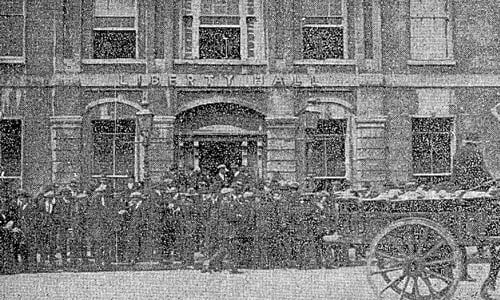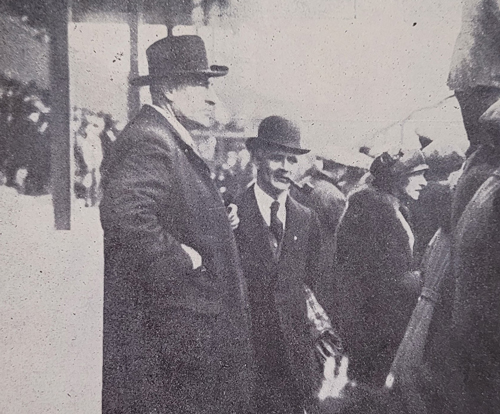No end in sight to Free State dockers strike
Belfast workers steadfast in refusal to handle diverted traffic
Belfast 6 August 1923 - The effect of a strike by dockers at Irish Free State ports, ongoing for more than twenty days, continues to threaten shipping activities in Northern Ireland.
Dockers employed on cross-channel ships sailing into Belfast, members of the Amalgamated Transport and General Workers’ Union (ATGWU), had ceased work as a protest against the diverting through Belfast of traffic bound for the Free State, only to secure an assurance that they would not be asked to handle diverted traffic.
However, it has since emerged that livestock traffic which they
had declined to handle has been diverted to Greenore, while
live-stock was being shipped at Larne where the dockers belong to
a different union.
ATGWU representatives of the Belfast dockers let it be known that
unless there is immediate compliance with their previous demand,
then work in connection with cross channel and coastal services
would cease.
At a conference held at the end of July to seek a settlement of the dispute, however, the ATGWU was not represented. Instead, four representatives of either side attended, the labour representation coming from the ITGWU whose delegation included Mr. Thomas Foran and Mr. James Larkin, An ATGWU official informed the Irish independent newspaper at the time that his union had ‘nearly 2,500 dockers working in Saorstát ports, names those of Waterford, Dundalk, Drogheda and Galway. In Galway the employers are paying the old rate of wages, so that there is no trouble on that section of the seaboard. We are doing everything to assist the dockers, members of the IT and GWU and in the Northern ports have refused to handle any traffic diverted from Dublin to these shipping centres.’

Strikers outsdie of Liberity Hall (Image: Irish Independent, 17 July 1923 )
As the strike continues, its impact on activity at Free State ports is plain for all to see. With the exception of Greenore, for example, there were no exports of livestock from any southern port in the week ended July 28.
As for incoming traffic, the degree to which importers have shifted towards ports in the six counties is borne out in the figures being reported week to week: the number of cattle coming through six county ports, for instance, increase over the course of one week from 5,270 to 9,286, with sheep numbers rising from 18,099 to 22,935 during the same period.
The effect of the strike is proving disastrous for, amongst others, the organisers of cattle fairs where supplies have been few and prices low. Prices for pigs and for farm produce have also dropped significantly.
A further consequence of the continuation of the strike has been the rise in uemployment, while some employers such as those associated with Dublin Chemical Manufacturers have moved their workers onto reduced wages.
[Editor's note: This is an article from Century Ireland, a fortnightly online newspaper, written from the perspective of a journalist 100 years ago, based on news reports of the time.]





















